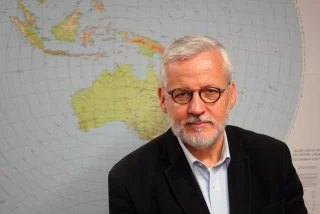Noted Australian Military Analyst Works Australian-U.S. Relations from the Ground Up
Recently, I discussed with my friend and colleague John Blaxland of the Australian National University his mission from ANU in the United States. He is a former Australian Army officer and a noted military analyst teaching at ANU and now also appointed as Director of the ANU’s North America Liaison Office (biography at the end of the article).
He and his wife have recently come to the United States for a long-term effort in support of ANU which is focused on working on relationships with universities, research institutes and think tanks to enhance cooperation with similar Australian institutions.
Most importantly, from my point of view, he is working to encourage American students to come and do university study in Australia. And given the challenges which both the United States and Australia face in a world increasingly shaped by authoritarian competitors, this is a key element of reshaping the future to our joint advantage.
The so-called AUKUS relationship will be hollow indeed if the younger generation does not take up the opportunity to shape joint understanding and perspectives in building a future which reflects common understanding and perspectives. John’s efforts are directly towards this end.
As he described his remit from ANU: “My remit is to engage with various universities and think tanks and research organizations to build bridges to Australia and open up opportunities for students to come to Australia who might not otherwise be aware of the opportunity.”
Australian universities do have many foreign students but prior to the pandemic the largest group were from China. This again will be the case if new efforts are not made to attract students from beyond the region to include India, Southeast Asia, the United States and Europe. Forging links among the liberal democracies is key and having students from the United States as part of this effort is a key goal of John’s work.
He emphasized in our discussion that Australian universities have world-class research facilities in many fields and can provide in depth knowledge of the Pacific region as well. Coming to school in Australia is certainly cost effective at current exchange rate levels and given the growing importance of the Pacific region, studying in Australia can be a gateway to gaining such knowledge. ‘It’s also a little bit exotic, but safe and operates in English’.
As Blaxland commented: “I’m encouraging people to think about how much the world looks different from Australia for an American. And yet, there’s so much about the way Australia looks at the world that echoes the interests and values, and complements the outlook, of the United States. Not the same but sufficiently overlapping, to make it a very attractive proposition for American students to come and study in Australia at the undergraduate or graduate level.”
Blaxland underscored that Australia provides the environment in which Americans along with their Australian peers can learn about “the nature of the world of the South Pacific, Indonesia, Malaysia and elsewhere in the region, including China, and to gain understanding of the joint interests in grappling with the authoritarian order that evidently is being shaped for us. Freedom is not simply inherited: it is forged in each generation.”
Dr John Blaxland is Director of the ANU North America Liaison Office and Professor of International Security and Intelligence Studies in the Strategic and Defence Studies Centre (SDSC), Coral Bell School of Asia Pacific Affairs, College of Asia and the Pacific at the ANU. A former military intelligence officer, he writes on military history, intelligence and international. security affairs.

